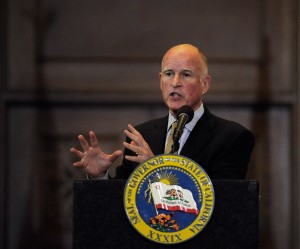Even Jon Coupal, president of the Howard Jarvis Taxpayers Association, said in a column that Brown could be "the new voice of reason" in Sacramento, with Republicans marginalized and Democratic lawmakers free to enact anything they like — and even override gubernatorial vetoes.
Brown acknowledged a "momentum and thrust" among liberals to try to restore programs that have experienced deep spending cuts during the recession, but he has been reiterating his admonitions that the state must keep spending in check.
"The problem is that the money that we've raised has already been spent, and the goal here was to bring our budget into balance, stop the bleeding in our schools and stabilize the yo-yo budgeting of the last 15 years, and so that's where we are," Brown said of his ballot initiative.
He added, "It's clear to me that we have to stay the course, and this will be a much better year than we've had for a long time."
Proposition 30, passed with 54 percent of the vote Nov. 6, is expected to generate an additional $6 billion a year by increasing the state sales tax a quarter cent and raising income taxes on those making $250,000 a year or more. Both tax increases are temporary.
The state's independent legislative analyst said California faces a much smaller budget deficit — about $1.9 billion — through the end of the next fiscal year and could even have surpluses after that. That compares with the $15.7 billion deficit lawmakers faced earlier this year.
Brown has a unique opportunity that few leaders get, Democratic political adviser Chris Lehane said. With all statewide offices held by Democrats and a supermajority in the Legislature, he said Californians will look to Brown to lay out a vision for restoring the state to greatness.
"I think people are going to want a sense of, big picture, where are we going as a state?" Lehane said. "I think they want to have a sense that there is a plan out there that can address what have been historically intractable issues. ... Now we have a chance to go in the right direction. How are we going to do that?"
Brown laid out a fairly extensive list of priorities the day after the November election. He said he would give his full attention to the state's longstanding water concerns, focus on the $68 billion high-speed rail project, revamp the state's education financing system and work to "calibrate our regulations" to ensure they are reasonable but still protect the environment, health and workers.
Senate President Pro Tem Darrell Steinberg also said Democrats will seek to rewrite an $11 billion water bond that is set to go before voters in 2014, rearranging its priorities and lowering the borrowing by at least $1 billion. Republicans had insisted on including the possibility of building new dams when the bipartisan package was approved by lawmakers in 2009, while Democrats generally favored alternatives such as cleaning up contaminated groundwater and increasing conservation efforts.
Brown, 74, also faces medical treatments for early stage prostate cancer, his second cancer scare since re-taking the office he first held from 1975 to 1983. He is undergoing radiation treatments that are expected to end the week of Jan. 7. In April 2011, he underwent surgery to remove a cancerous growth on the right side of his nose.
Looking ahead to a year of promise, Brown views his role as charting the middle ground.
"I see my job as someone who has to examine closely the various excesses that are presented and find a wise balance," he said.
